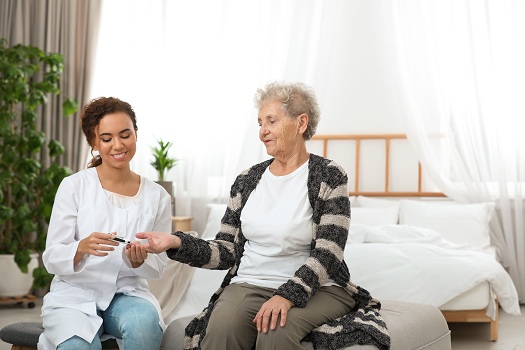According to the American Diabetes Association, approximately 25 percent of Americans over 60 have diabetes. If your elderly loved one falls into this demographic, it’s important to address the condition to avoid more serious issues. Here are a few ways you can help your loved one accomplish this.
Provide Adequate Care
If your loved one finds diabetes treatment complicated or otherwise difficult to handle, take over his or her care routines. Remind your parent to take medication on schedule, and work together to create a healthy diet plan. If you can’t personally provide the care your loved one needs, speak to his or her physician about simplifying the treatment program or consider hiring a caregiver to assist your loved one while you’re away.
If your senior loved one needs help managing an illness or assistance with daily tasks, make sure you choose a top-rated provider of elder care. Home Care Assistance is here to help your loved one live a happier and healthier life in the golden years. From the mentally stimulating activities in our Cognitive Therapeutics Method to our friendly Care Managers who are available to answer your questions 24 hours a day, we offer a wide array of high-quality at-home care services.
Educate Yourself
Uncontrolled blood sugar levels can lead to potentially devastating consequences. To provide the best care possible, learn the signs of hypoglycemia (low blood sugar) and hyperglycemia (high blood sugar), and determine what steps to take if your loved one exhibits these symptoms. For instance, seniors with hypoglycemia may become shaky or begin to lose consciousness. Those with high blood sugar levels may have blurred vision, extreme thirst, or nausea. These symptoms should be treated immediately, either at home with food or medicine or at the nearest emergency room.
Keep Track of Blood Sugar Levels
Seniors may not be willing to fully cooperate with the diet or medication routine recommended for those with diabetes. Keep track of your loved one’s blood sugar levels on a daily basis, and discuss the readings at doctor’s appointments. In some cases, strict control of blood sugar is less important than quality of life.
There are a variety of age-related health conditions that can make it more challenging for seniors to live independently. However, many of the challenges they face can be easier to manage if their families opt for professional senior home care. Anchorage families can rely on expertly trained caregivers to keep their loved ones safe and comfortable while aging in place.
Be an Example
If you are your loved one’s primary caregiver, follow the same diet and exercise routine as your parent to encourage healthy behaviors. Avoid purchasing junk food, and spend time each day gardening, walking, or engaging in another physical activity to encourage healthy blood sugar levels. This not only benefits both you and your loved one’s health but also enhances solidarity and strengthens the bond between the two of you.
Caring for a senior loved one can be rewarding, but it can also be overwhelming for family caregivers who have other responsibilities they need to focus on. For these families, the perfect solution is respite care. Anchorage families rely on our caregivers whenever they need time to rest, work, run errands, and even go on vacation. Call Home Care Assistance today at (907) 770-0907 to learn about our high-quality in-home care services.
